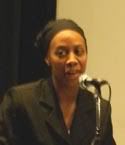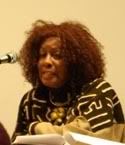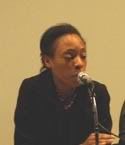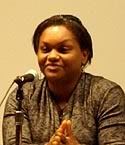![]()
New York's Castillo Theatre presented an inspiring production of Aime Cesaire's A Season In The Congo Sunday, followed by a panel discussion of current issues in the Democratic Republic of Congo that perfectly complimented the many issues raised by the play, which centers on the rise and fall of Patrice Lumumba.
Cesaire, one of the greatest French language poets of the 20th century, wrote the play in 1966, just five short years after Lumumba was assassinated. The struggle for control of the Congo's wealth which caused Lumumba's murder continues today, as several members of the panel pointed out.
The production itself was spirited and intense, with a cast of over twenty actors drawn from the youth programs of the All Stars Project and the adult volunteers of the theater. A groups of dancers from Brownsville, Brooklyn, also took part and dozens of volunteers of all ages made up the production team. The play was directed by Brian Mullin.
Four separate actors took on the lead role of Patrice Lumumba, a directorial decision that added much nuance and depth to the character. The martyred leader was portrayed by Jube Charles, Christlabelsay Elian, Diana Lumaque, and Shaakirah Medford.
The panel discussion was moderated by Carolyn Kresky, a three-time Emmy Award winning broadcast journalist and a founder of the Castillo Theatre. She asked the participants to draw on their own experiences with the Congo of today to the events depicted by the play. There were many connections.![]() Maurice Carney, Executive Director of Friends of the Congo, pointed out that America has been involved in the Congo since 1885, when it was the first nation to officially bless King Leopold's claim to sovereignty over the territory. He also explained that control of the Congo's wealth is a world issue, with implications for not just the DRC but the continent of Africa as well. He quoted Lumumba in the last letter he wrote to his wife just before his death:
Maurice Carney, Executive Director of Friends of the Congo, pointed out that America has been involved in the Congo since 1885, when it was the first nation to officially bless King Leopold's claim to sovereignty over the territory. He also explained that control of the Congo's wealth is a world issue, with implications for not just the DRC but the continent of Africa as well. He quoted Lumumba in the last letter he wrote to his wife just before his death:
"We are not alone. Africa, Asia, and free and liberated people from every corner of the world will always be found at the side of the Congolese."Lisa Jackson, whose film "The Greatest Silence: Rape In The Congo" has truly opened the world's eyes to the epidemic of terror rape in the war zones of the eastern provinces, spoke about the passivity of the United Nations in today's Congo and how it has not changed in the last fifty years.
 Noella Coursaris Musunka said that her recent experiences in the Congo convinced her that the country needs a new Lumumba. The internationally acclaimed model is the founder of the Georges Malaika Foundation, a nonprofit organization dedicated to providing educational opportunities for young girls in the Democratic Republic of Congo.
Noella Coursaris Musunka said that her recent experiences in the Congo convinced her that the country needs a new Lumumba. The internationally acclaimed model is the founder of the Georges Malaika Foundation, a nonprofit organization dedicated to providing educational opportunities for young girls in the Democratic Republic of Congo.Panelist Deborah Green was the Political Director of the Rainbow Lobby, an independent people’s lobby that aided the democracy movement in the Congo from 1986 to 1992. She drew a direct connection between the use of inter-tribal strife featured in the play and the similar strategies used by today's warlords and behind-the-scenes operators in the DRC.
 Joseph T. Mbangu is a Congolese attorney and an activist based in New York City. He was studying law on the border of Rwanda when the genocide began. He fled the area, completed his law degree and immigrated to the US in 1999. He believes the play was very timely given the nascent movement among the Congolese Diaspora and others to bring the nation into its rightful place in the sun. He, too, quoted Lumumba, citing words he spoke during his inauguration:
Joseph T. Mbangu is a Congolese attorney and an activist based in New York City. He was studying law on the border of Rwanda when the genocide began. He fled the area, completed his law degree and immigrated to the US in 1999. He believes the play was very timely given the nascent movement among the Congolese Diaspora and others to bring the nation into its rightful place in the sun. He, too, quoted Lumumba, citing words he spoke during his inauguration:"The Congo has been proclaimed a Republic and our beloved country is now in the hands of its own children."From the applause that greeted that line, I believe the audience fully agreed.
My thanks to Misengabo Esperance Kapuadi for her gracious permission to use her photographs of the event.
Dave Donelson, author of Heart of Diamonds a romantic thriller about blood diamonds in the Congo.












